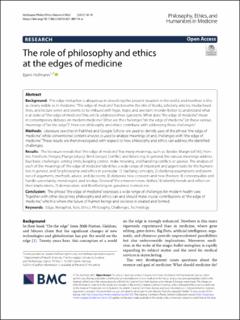| dc.description.abstract | Background
The edge metaphor is ubiquitous in describing the present situation in the world, and nowhere is this as clearly visible as in medicine. “The edge of medicine” has become the title of books, scholarly articles, media headlines, and lecture series and seems to be imbued with hype, hope, and aversion. In order better to understand what is at stake at “the edge of medicine” this article addresses three questions: What does “the edge of medicine” mean in contemporary debates on modern medicine? What are the challenges “on the edge of medicine” (in these various meanings of “on the edge”)? How can philosophy and ethics contribute with addressing these challenges?
Methods
Literature searches in PubMed and Google Scholar are used to identify uses of the phrase “the edge of medicine” while conventional content analysis is used to analyze meanings of and challenges with “the edge of medicine.” These results are then investigated with respect to how philosophy and ethics can address the identified challenges.
Results
The literature reveals that “the edge of medicine” has many meanings, such as: Border; Margin (of life); Frontier; Forefront; Fringes; Plunge (abyss); Brink (verge); Conflict; and Balancing. In general, the various meanings address four basic challenges: setting limits, keeping control, make meaning, and handling conflicts or aporias. The analysis of each of the meanings of “the edge of medicine” identifies a wide range of important and urgent tasks for the humanities in general, and for philosophy and ethics in particular: 1) clarifying concepts; 2) clarifying assumptions and premises of arguments, methods, advice, and decisions; 3) elaborate new concepts and new theories; 4) conceptualize and handle uncertainty, moral regret, and residue; 5) reveal “the emperor’s new clothes;” 6) identify trends and reflect on their implications; 7) demarcation; and 8) reflecting on goodness in medicine.
Conclusion
The phrase “the edge of medicine” expresses a wide range of challenges for modern health care. Together with other disciplines philosophy and ethics can and should make crucial contributions at “the edge of medicine,” which is where the future of human beings and societies is created and formed. | en_US |

